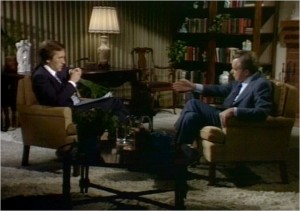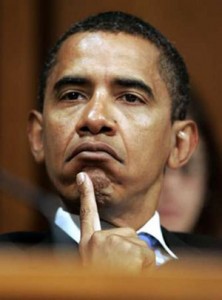 In 1977, David Frost interviewed former President Richard Nixon about the great Watergate scandal that brought down his presidency. Frost had asked Nixon about some of the tactics he and his administration had used to cover up the break-in of the Watergate hotel, and during the course of their dialogue, Nixon made a statement that ought to make all lovers of liberty lift an eyebrow: “…when the President does it that means that it is not illegal.” When asked activities that constituted obstruction of justice, President Nixon asserted that a president’s involvement means that such otherwise illegal activities are legal.
In 1977, David Frost interviewed former President Richard Nixon about the great Watergate scandal that brought down his presidency. Frost had asked Nixon about some of the tactics he and his administration had used to cover up the break-in of the Watergate hotel, and during the course of their dialogue, Nixon made a statement that ought to make all lovers of liberty lift an eyebrow: “…when the President does it that means that it is not illegal.” When asked activities that constituted obstruction of justice, President Nixon asserted that a president’s involvement means that such otherwise illegal activities are legal.
This is the logical equivalent of saying that the President of the United States is the law of the land, as opposed to the Constitution of this country. This is an absolutely un-American assertion, which is anathema to our republican system of government.
The freedoms of the American people are protected by quintessentially American conviction that the law, based on and codified in the Constitution, is the source of authority in this country. This means that no public official, not even a president, is above the law or is, himself, the source of law. The belief that the ruler is the law is the position taken by potentates and dictators through the ages. If we ever allow such beliefs to take root in America, the rule of law will fail and our freedoms will fade.
This is why the position recently taken by President Barack Obama with regard to an executive order on the DREAM Act is so dangerous.
 Regardless of one’s feelings about the DREAM Act, or immigration policy in general, the biggest issue here is that the President imposed a policy that is the prerogative of Congress to set. The issue isn’t so much what the President’s executive order does with regard to immigration enforcement; it’s that the President usurped the power of the legislature in instituting such a change in the application of the law.
Regardless of one’s feelings about the DREAM Act, or immigration policy in general, the biggest issue here is that the President imposed a policy that is the prerogative of Congress to set. The issue isn’t so much what the President’s executive order does with regard to immigration enforcement; it’s that the President usurped the power of the legislature in instituting such a change in the application of the law.
Immigration policy is to be set by Congress, therefore, under the Constitutional separation of powers, the President is required to enforce policies already on the books. Current immigration law is clear about its enforceability, and the President’s decision to alter the implementation of that enforceability is an infringement on the legislative branch. Regardless if one is for or against the DREAM Act, the greater principle at play here is whether or not America is still ruled by the rule of law.
President Obama’s executive order on immigration enforcement is a short term solution to a long term problem, but its precedent will present a problem for the foreseeable future. That’s because the President’s order, with regard to immigration enforcement, may be immediately overturned by a future president, but the practice of a president by-passing Congress to achieve policy change is likely to linger.
It is reasonable to expect that future presidents will look back at Barack Obama’s use of executive orders to alter national policy, without the inclusion of the people’s representatives in Congress, and decide to do the same. If Republican presidents do it, Republicans should be equally outraged; I’m sure the same Democrats that support Obama’s use of such a practice will be incensed.
While Americans of all political leanings agreed the President Nixon overstepped his authority, where is the outrage over Obama’s use of executive orders? Folks who believe in freedom were rightly angered at Nixon’s assertion that “…when the president does it that means that it is not illegal.” That same philosophy, however, is being used by President Obama to circumvent Congress on marriage (DOMA) and immigration (DREAM Act) and a whole host of other policy proposals.
That’s also illegal, but when will the public remind him that the rule of law, not the rule of presidents, still matters in America?
I hope it does this November.





1 thought on “Obama’s Grasp for Imperial Power”
Comments are closed.